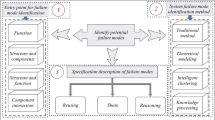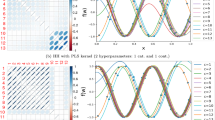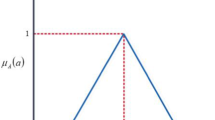Abstract
The Taguchi method is a widely used conventional approach for robust design that combines experimental design with quality loss functions. However, this method can be only used in a single-response problem. In this study, we propose the use of principal component analysis (PCA) to consider multi-response problems in the Taguchi method and to investigate the influence factor of a cab suspension system. We compute the normalized quality loss for each response and perform PCA to calculate the multi-response performance index. In this study, control factors with three level combinations and noise factors with random sampling from each normal distribution are considered. Additionally, we applied multi-objective reliability based robust design optimization (RBRDO) to accommodate design uncertainties and its data scattering based on rational probabilistic approaches. This is used to develop the reliability assessment and reliability based design optimization and corresponds to an integrated method that accounts for the design robustness in the objective function and reliability in the constraints.







Similar content being viewed by others
References
Antony J (2000) Multi-response optimization in industrial experiments using taguchi’s quality loss function and principal component analysis. Quality and Reliability Eng International 16:3–8
Arora JS, Elwakeil OA, Chahande AI, Hsieh CC (1995) Global optimization methods for engineering applications: a review. Structural Optimization 9:137–159
Beck AT, de Santana Gomes WJ (2012) A comparison of deterministic, reliability-based and risk-based structural optimization under uncertainty. Probabilistic Eng Mechanics 28:18–29
Choi K, Lee G, Choi DH (2009) Reliability-based design optimization using kriging Metamodel with sequential sampling technique. Trans Korean Soc Mech Eng A 33:1464–1470
Coello CAC, Pulido GT (2005) Multiobjective structural optimization using a microgenetic algorithm. Struct Multidisc Optim 30:388–403
Cole DJ (2001) Fundamental issues in suspension Design for Heavy Road Vehicles. Veh Syst Dyn 35:319–360
Der Kiureghian A, Lin HZ, Hwang SJ (1987) Second-order reliability approximations. J Engrg Mech, ASCE 113:1208–1225
Enevoldsen I, Sorensen JD (1994) Reliability-based optimization in structural engineering. Struct Saf 15:169–196
Gauri SK, Pal S (2014) The principal component analysis (PCA)-based approaches for multi-response optimization: some areas of concerns. Int J Adv Manuf Technol 70:1875–1887
Haftka RT, Scott EP, Cruz JR (1998) Optimization and experiments: a survey. Appl Mech Rev 51:435–448
Jean MD, Wang JT (2006) Using a principal components analysis for developing a robust Design of Electron Beam Welding. Int J Adv Manuf Technol 28:882–229
Jeong SB, Lee SJ, Park GJ (2012) Improvement of the convergence capability of a single loop single vector approach using conjugate gradient for a concave function. Trans Korean Soc Mech Eng A 36:805–811
Jollife L (2002) Principal component analysis. John Wiley and Sons, Ltd., New Jersey
Kaiser HF (1960) The application of electronic computers to factor analysis. Educ Psychol Meas 20:141–151
Kim MS, Kim JR, Jeon JY, Choi DH (2001) Design optimization using two-diagonal quadratic approximation. Trans Korean Soc Mech Eng A 25:1423–1431
Lee I, Choi KK, Du L, Gorsich D (2008a) Dimension reduction method for reliability-based robust design optimization. Comput Struct 86:1550–1562
Lee JS, Choi GJ, Lee KH (2008b) Ride performance evaluation of a heavy truck semi-active cabin air suspension system. Trans Korean Soc Automotive Eng 16:77–83
Lee I, Shin J, Choi KK (2013) Equivalent target probability of failure to convert high-reliability model to low-reliability model for efficiency of sampling-based RBDO. Struct Multidisc Optim 48:235–248
Motta RS, Afonso SMB (2016) An efficient procedure for structural reliability-based robust design optimization. Struct and Multidisc Opt 54(3):511–530
Phadke MS (1989) Quality engineering using robust design. Prentice-Hall, Englewood Cliffs
Sandgren E, Cameron TM (2002) Robust design optimization of structures through consideration of variation. Comput Struct 80:1605–1613
Shahrak AF, Noorossana R (2014) Reliability-based robust design optimization: a general methodology using genetic algorithm. Comput Ind Eng 74:199–207
Sim HM, Song CY, Lee J, Choi HY (2012) A preliminary study of reliability based robust optimization using conservative approximate meta-models. J of Ocean Eng and Technol 26:80–85
Song CY, Lee J (2010) Comparative study of approximate optimization techniques in CAE based structural design. Trans Korean Soc Mech Eng A 34:1603–1611
Su CT, Tong LI (1997) Multi-response robust design by principal component analysis. Total Qual Manag 8:409–416
Tu J, Choi KK, Park YH (1999) A new study on reliability-based design optimization. ASME J of Mech Design 121:557–564
Yang YS, Park CK, Lee KH, Suh JC (2007) A study on the preliminary ship design method using deterministic approach and probabilistic approach including hull form. Struct Multidisc Optim 33:529–539
Youn BD, Choi KK (2004) A new response surface methodology for reliability-based design optimization. Comput Struct 82:241–256
Youn BD, Xi Z (2009) Reliability-based robust design optimization using the eigenvector dimension reduction (EDR) method. Structural Optimization 37(5):475–492
Yu X, Choi KK, Chang KH (1997) A mixed design approach for probabilistic structural durability. Structural Optimization 14:81–90
Acknowledgements
This research is supported by the Basic Science Research Program through the National Research Foundation of Korea (NRF), funded by the Ministry of Science, ICT & Future Planning (2017R1A2B4009606). This work is supported by the Korea Institute of Energy Technology Evaluation and Planning (KETEP) and the Ministry of Trade, Industry & Energy (MOTIE) of Republic of Korea (20163030024420). This research is supported by NGV & Hyundai Motor Group (2016-11-0906).
Author information
Authors and Affiliations
Corresponding author
Rights and permissions
About this article
Cite this article
Lim, J., Jang, Y.S., Chang, H.S. et al. Role of multi-response principal component analysis in reliability-based robust design optimization: an application to commercial vehicle design. Struct Multidisc Optim 58, 785–796 (2018). https://doi.org/10.1007/s00158-018-1908-4
Received:
Revised:
Accepted:
Published:
Issue Date:
DOI: https://doi.org/10.1007/s00158-018-1908-4




